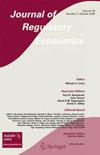Command-and-control regulation, incentive for pollution abatement, and market structure
IF 1.4
4区 经济学
Q3 ECONOMICS
引用次数: 0
Abstract
This paper analyzes the effect of command-and-control regulation on firms’ incentives for pollution abatement, market structure, and social welfare. We consider a regulation under which firms are not allowed to produce if they were found in noncompliance with the preset emissions standard during the government’s imperfect inspection. In the case of the ex ante monopoly, a loose standard coupled with an intensive inspection effectively induces perfect compliance. In the case of the ex ante duopoly, the intensified inspection directly creates market entry barriers, but it also induces firms to increase abatement investments for better environmental compliance, which indirectly promotes market competition. Moreover, a firm invests more in pollution abatement if it is initially cleaner or more production-efficient than its rival, or if it has fewer potential rival. We also find that regulatory tightening may harm social welfare by reducing the probability of entry, and social welfare may be higher under monopoly than under duopoly when government inspection is sufficiently intensive.指令控制型监管、减少污染的激励机制和市场结构
本文分析了命令控制型法规对企业减少污染的激励、市场结构和社会福利的影响。我们考虑了这样一种规制:如果企业在政府的不完全检查中被发现不符合预设的排放标准,则不允许其生产。在事前垄断的情况下,宽松的标准加上密集的检查可以有效地促使企业完全遵守标准。在事前双垄断的情况下,强化检查会直接造成市场进入壁垒,但同时也会促使企业增加减排投资以更好地遵守环境标准,从而间接促进市场竞争。此外,如果一家企业最初比其竞争对手更清洁或生产效率更高,或者如果其潜在竞争对手更少,那么该企业就会在污染减排方面进行更多投资。我们还发现,监管收紧可能会降低企业进入市场的概率,从而损害社会福利;当政府检查力度足够大时,垄断下的社会福利可能会高于双头垄断。
本文章由计算机程序翻译,如有差异,请以英文原文为准。
求助全文
约1分钟内获得全文
求助全文
来源期刊

Journal of Regulatory Economics
ECONOMICS-
CiteScore
2.40
自引率
0.00%
发文量
14
期刊介绍:
Recent legislative and policy reforms have changed the nature of regulation. Partial deregulation has created a new dimension to regulatory problems, as the debate is extended to include diversification and new forms of regulation. The introduction of incentive-based rate schedules and ratemaking procedures, the integration of demand-side programs with planning for capitol expansion, and other developments, raise a host of theoretical and empirical questions. The Journal of Regulatory Economics serves as a high quality forum for the analysis of regulatory theories and institutions by developing the rigorous economics foundations of regulation. Both theoretical and applied works, including experimental research, are encouraged. Research in all aspects of regulation is of interest including traditional problems of natural monopoly, antitrust and competition policy, incentive regulation, deregulation, auction theory, new policy instruments, health and safety regulation, environmental regulation, insurance and financial regulation, hazardous and solid waste regulation, universal service obligation, and consumer product regulation. The JRE provides researchers, policy-makers, and institutions with current perspectives on the theory and practice of economics of regulation. While there are a number of journals and magazines that include the study of regulation, the JRE is unique in that it fills a gap in the market for a high quality journal dealing solely with the economics of regulation.Officially cited as: J Regul Econ
 求助内容:
求助内容: 应助结果提醒方式:
应助结果提醒方式:


